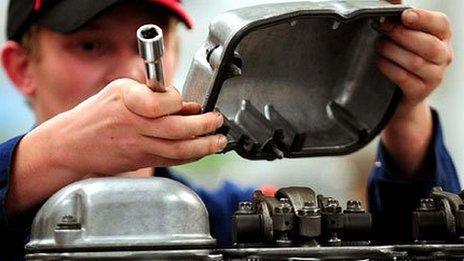Parental careers advice to children often 'out of date'
- Published
- comments

Colleges want young people to have more advice about vocational options
Parents play a key role in their children's career decisions, but their views are often out of date and badly informed, suggests a report.
Some 70% of young people trust their parents for job advice, says the Association of Colleges (AoC) report.
Careers advisers should liaise with local employers and update parents and pupils about local jobs markets and emerging industries, urge the authors.
"Uninformed family members can hinder a child's ambitions," they warn.
Parents can sometimes "push" their children "towards careers that are seen to be safe or traditional, but possibly not best suited to the individual or taking into account emerging industries", they argue.
'Drastic changes'
The authors drew on an AoC survey earlier this year and carried out in-depth interviews with parents, children and careers specialists at colleges in Barking and Dagenham, Middlesbrough and Weymouth.
The survey of just over 2,000 secondary pupils in England found only 49% felt well informed about what jobs are available.
The AoC says the young people interviewed wanted "drastic changes" to careers advice, including better links with employers, the chance to "have a go" at real jobs, longer-term work experience and relevant local information.
The findings follow repeated warnings about weaknesses in careers advice from bodies ranging from Ofsted to the Confederation of British Industry and the Education Select Committee.
In 2012 schools were given statutory responsibility for giving independent careers information to students. Before then local authorities had provided careers services to schools, mainly through local Connexions Services.
The report says there is no systematic checking on the statutory duty and raises concerns that students are not getting enough information about vocational routes such as apprenticeships or courses offered in further education colleges.
The researchers say the young people they interviewed were aware of career opportunities in jobs they had actually seen in their daily lives, such as teachers, police officers or hairdressers.
However, they had little idea what jobs were available to them locally or which companies and industries were the largest employers.
Ms Sutton said the report showed young people felt they needed "more practical guidance" about how to go about researching jobs and the steps they needed to take.
"It's our responsibility as adults to become better informed about the local jobs market to be able to offer more relevant realistic and timely advice."
Government guidance
A Department for Education spokesman said: "This report underlines why we are right to be encouraging schools to involve employers in careers advice.
"Our new guidance for schools on careers makes this clear. Schools should use employers to inspire, mentor and inform young people towards their best-suited careers.
"Three-quarters of employers say work experience is at least significant when recruiting, so it is vital schools get young people real-life contact with the world of work."
Adrian Prandle, policy adviser at the Association of Teachers and Lecturers, said: "It is no surprise that young people are unsatisfied with the level and type of careers support they receive.
"The government was absolutely reckless, especially in a period of high youth unemployment, to scrap the careers service without providing a proper replacement.
"We agree that the solution is collaborative, and partnerships between schools, colleges, employers, Job Centre Plus and others, must be widespread".
- Published13 January 2014

- Published18 November 2013

- Published5 June 2013

- Published23 November 2012
